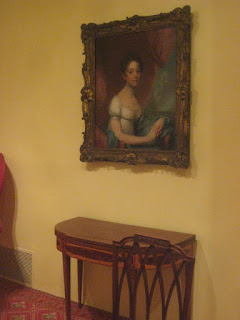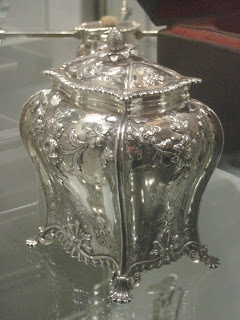One of my favorite museums in Baltimore is the Baltimore museum of art.
Housed in a 1920's Classical temple building designed by architect John Russell
Pope, The museums collection started from a single object in 1914, The Baltimore
Museum of Art’s internationally renowned collection today encompasses 90,000
works of art, including the largest holding of works by Henri Matisse in the
world, as well as masterpieces by Pablo Picasso, Paul Cézanne, and Vincent van
Gogh.
The BMA’s holdings of American decorative arts include an extensive
furniture collection that represents the major historic cabinetmaking centers of
18th and 19th century Baltimore, Philadelphia, New York, and Boston. Many of
these objects came from Miss Dorothy McIlvain Scott, a generous Baltimore
philanthropist and collector.
A remarkable gift in 1933 by Mrs. Miles White, Jr. of over 200 stunning
pieces of Maryland silver formed the nucleus of an impressive silver collection
that now embraces objects by leading 18th- and early 19th-century silversmiths
in Annapolis and Baltimore, as well as elegant examples of early English silver
owned by Maryland families during the Federal era. Later masterworks by artists
from Louis Comfort Tiffany to Georg Jensen are also on view.
Other notable aspects of the decorative arts collection include a rare
set of five clerestory windows and two brilliant mosaic-clad architectural
columns that represent Tiffany's lasting contribution to 20th-century ornament.
Period rooms from six historic Maryland houses, along with architectural
elements from other historic buildings, illustrate town and country building
styles from the 18th and 19th centuries, and a dozen miniature rooms made by
Chicago miniaturist Eugene Kupjack invite scrutiny of a variety of decorative
styles at close range.
The BMA has an outstanding collection of American
painting, sculpture, and decorative arts dating from the colonial era to the
late 20th century. Among the highlights are important regional holdings such as
Maryland-related portraiture by Charles Willson Peale, Rembrandt Peale, and
other members of the renowned Peale family; silver from Baltimore's prominent
silver manufacturing company Samuel Kirk & Son;and painted furniture by John
and Hugh Finlay of Baltimore.








































































The Baltimore Museum of Art was really smart setting up dedicated rooms to the decorative arts. Too often what we get in a museum of art is:
ReplyDeletepainting
sculpture
architecture
and, perhaps, furniture.
The silver is gorgeous... I must look up Samuel Kirk & Son. And the porcelain is similarly lovely - were they imported from Europe by some very elegant collector?
Thanks for the show of the museum... one of my favorite things, those ice cream servers... would love to have one but they are all in museums. You snapped a particularly lovely one... oh well, I can dream!
ReplyDeleteHi Helen, Thanks for your comment. What you said is to true. Most museums do not have decorative arts to display along with paintings. Yes most of the porcelain shown was imported from France and England when new by wealthy people of Baltimore.
ReplyDeleteThanks for your comment lostpastremembered, I use to see them every once and a while on ebay for sale but I have not looked at ebay in years. The English set with the Greek Key is to die for.